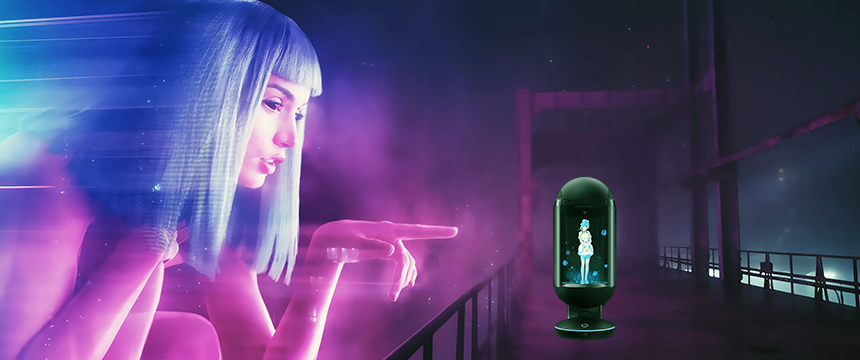Research Seminar - Holograms and (Dis) Embodied Intimacy in an Era of Ubiquitous Computing
Holograms and (Dis) Embodied Intimacy in an Era of Ubiquitous Computing
Presented by: Dr Samantha Lindop
Date: Friday 18 June 2021
Time: 12–1pm
Location: Online via Zoom
Abstract
Central to ubiquitous computing is the assimilation of interactive technologies into the everyday material world, allowing for progressively seamless interconnections between humans and software. Ubiquitous computing refers to nomadic, human centred technologies that move through physical space with us via equipment that is perpetually connected to the internet. This includes smart devices, personal assistants, and wearables, but it also applies to multisensory AI innovations like Gatebox’s 3D holographic companion/wife Azuma Hikari: a goldfish sized moe figuring housed in a high-tech glass capsule. This presentation examines the role of holographic technologies to facilitate human-software interrelationships from a posthuman perspective. Drawing on fictional representations of humanoid-hologram intimacy in Denis Villeneuve’s Blade Runner 2049 (2017) and real-life creations Azuma Hikari and Hatsune Miku, I argue that 3D holographic humanoids obfuscate boundaries between organic and synthetic, material and immaterial in significant ways. Holographs are a graphic example of how hybridised spaces created by ubiquitous computing, coupled with increasingly perpetual connectivity, promote and naturalise intimate posthuman fantasies. The partial disembodiment of humans in technologically mediated spheres, coupled with the partial embodiment of software using holographic interfaces, generates liminal counter-sites that exist between the real and imaginary – other spaces that align with what Michel Foucault calls heterotopias. Significantly, with increasing infiltration of such connected technologies into the everyday, the notion of place/space becomes progressively fragmented and destabilised to the extent that technological heterotopias, or techno-heterotopias, are themselves ubiquitous and normalised, radically transforming human-machine interconnections now and in the future.
Presenter
Samantha Lindop has a PhD in Film, Media, and Cultural Studies. Her doctoral dissertation involved examining gender representations in the cinematic style film noir. She is the author of the book Postfeminism and the Fatale Figure in Neo-Noir Cinema (Palgrave, 2015). Her second monograph The Stepford Wives (Liverpool University Press, 2021) offers a timely and compelling study of Brian Forbes’ 1975 cult film The Stepford Wives, locating it in the traditions of the gothic, histories of feminism, fictional imaginings about artificial women, and the futures of social robots both real and imagined. More broadly, her current research explores gender and posthumanism with a special focus on virtual companions and other forms of artificial intelligence. She also has scholarly publications on topics of sci-fi cinema, vampires, the uncanny, the gothic, and more.
About Research Seminar and Workshop Series
School of Communication and Arts Research Seminar Series
The research seminar and workshop series occur each semester, each with a different topic and guest speaker from UQ or otherwise.
Friday, 28 February Hybrid: Online via Zoom and in person at the | Generative Hate | |
Friday, 21 March Hybrid: Online via Zoom and in person at the | Close Encounters of the Hermeneutic Kind: UFOs as More-than-Human Media | |
Friday, 11 April Hybrid: Online via Zoom and in person at the | Indigenous and Local Knowledge Systems and Community Radio in India | A/Prof Elske van de Fliert |
Friday, 23 May Hybrid: Online via Zoom and in person at the | The Drama Of Anthropological History | |
Friday, 6 June Hybrid: Online via Zoom and in person at the | Video, Bias, Action. Mitigating Cognitive Biases through Role-Play Video Scenarios | |
Thursday, 31 July Hybrid: Online via Zoom and in person at the | Crossing Disciplinary Boundaries: Experiments in Public Engagement | Prof Sally Shuttleworth (Oxford University) |
Friday, 8 August Hybrid: Online via Zoom and in person at the | Designing engagement for coral reef rescue | A/Prof Elske van de Fliert and Dr Skye Doherty |
Friday, 22 August Hybrid: Online via Zoom and in person at the | Pigeon Fool’s Turing test: The relationship between embodied AI bots and networked and absent humans | Dr Abbie Trott |
Friday, 19 September Hybrid: Online via Zoom and in person at the | War in Our Hyperconnected World: Exposing the Invisible Battlespace | Dr Kathryn Brimblecombe-Fox |
Friday, 17 October Hybrid: Online via Zoom and in person at the | A/Prof Alberto N. García (Universidad de Navarra) | |
Friday, 24 October Hybrid: Online via Zoom and in person at the | Forking paths, simultaneous timelines and river monsters: an origin-story artist talk from early hypertext to XR storytelling machines | Prof Caitlin Fisher (York University, Canada) |

